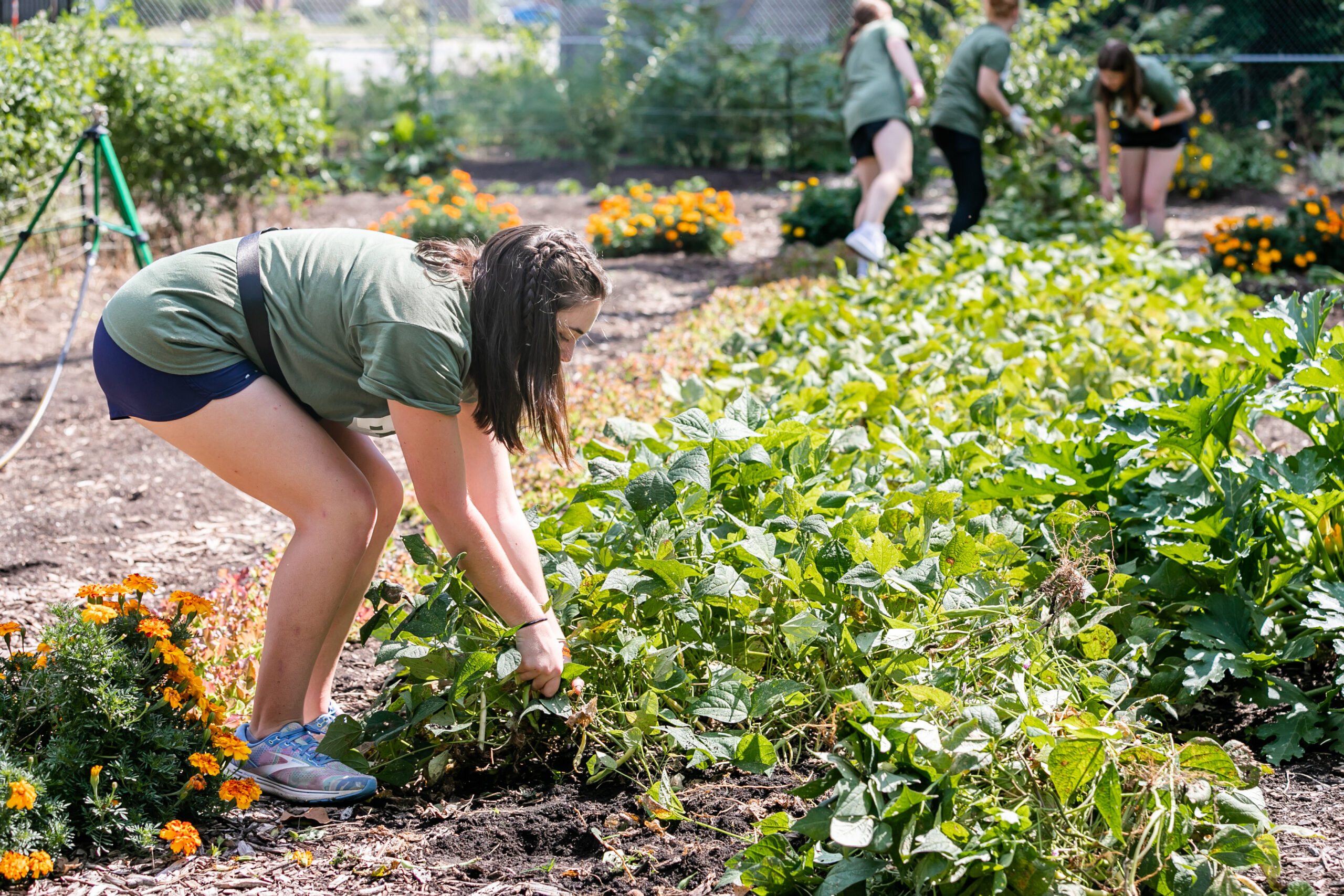After a two-year hiatus, BITS has returned to Butler. Photos by Lauren Hough.
JACK WILLIAMS | STAFF REPORTER | jrwilliams@butler.edu
After taking a break due to COVID-19, the Bulldogs Involved Through Service, BITS, program, formerly known as Bulldogs Into the Streets, has returned to Butler University. BITS serves as a single kickoff event to expose students to service, which they can then engage in throughout the year with Butler’s Volunteer Center.
The theme of this year’s program was Food Insecurity and Food Justice. Student volunteers gathered early on the morning of Saturday, Aug. 28 to hear from speaker Matthew Feltrop. Feltrop is executive director of The Patachou Foundation, whose charitable mission, according to their website, is “to cultivate opportunity for youth by amplifying the value and power of food.”
Volunteers were then broken into groups and sent to several service sites in the Indianapolis area including The Patachou Foundation and Gleaners, Indiana’s largest food pantry. After the service, student leaders led each group in a reflection based on three questions: “what,” “so what,” and “now what.”
The service sites
The first reflection question, “what,” asks volunteers about their physical labor.
Sophomore international business major Alexis Worl was a site leader at Gleaners food bank. Her group sorted food donations into categories after the donations were inspected for quality by another Butler group.
“We organized [the food] so the other people could spend more time with the actual consumers,” Worl said.
This is an example of indirect service, where volunteers do behind-the-scenes work to keep a charity running smoothly. Direct service requires personal contact with those being served. Each method is equally valuable.
Volunteers who worked at Patachou’s farm also participated in indirect service.
The impact of service
The second reflection question, “so what,” asks volunteers to think about the meaning behind their service. The most effective service addresses systemic causes of an injustice as well as an immediate need.
This mindset is exactly what Kate Franzman, the director of impact for the Patachou Foundation, wants to see.
“What would our city or our world look like if these skills around self-sustainability were just inherent in our education?” Franzman said. “Growing and cooking your own food, those are two huge skills that not only are great for your everyday life but you can make a career out of it.”
This education would meet the problem of food injustice at one of its roots.
Sophomore health sciences major Ellie Cornn was a site leader at the Patachou Foundation, which serves after-school meals to underserved children. She was pleasantly surprised that Franzman took time to educate her group on food injustice.
“I envisioned we would be packing sack lunches or preparing brochures or doing something that they needed at that moment,” Cornn said. “I feel like more of her goal was to educate, and she did a fantastic job.”
Cornn said she and her group left Patachou armed with knowledge about food injustice they can share. When volunteers are taught about the impact of their service, it makes them feel valued and provides incentive to return.
What a Butler student can do
The last reflection question, “now what,” asks how volunteers can continue to serve. One of the goals of BITS is to draw students out into the practice of service through education and hands-on experience.
Cornn believes Butler’s Office of Civic Engagement and Caroline Huck-Watson, the organizer of BITS, created a powerful experience. They worked alongside student leaders to structure the program. She hopes BITS and other service opportunities will continue to expand and help students step outside the colloquial Butler bubble — the insulated environment which some students experience in college.
First-year pre-pharmacy major Maddie Siems served at Gleaners during BITS. She enjoyed her service but thought BITS could have been advertised more, given its importance.
Promoting opportunities like BITS during student orientation or through extra promotion on social media would give more students a chance to participate. Student leaders Worl and Cornn were also leaders in Butler’s service-based pre-orientation program Ambassadors of Change.
“I’ve just been blessed with what I’ve been given, and I’ve always been taught that if you have a lot, you give a lot,” Cornn said in response to what service means to her.Students interested in service can get involved through Butler’s Volunteer Center.






